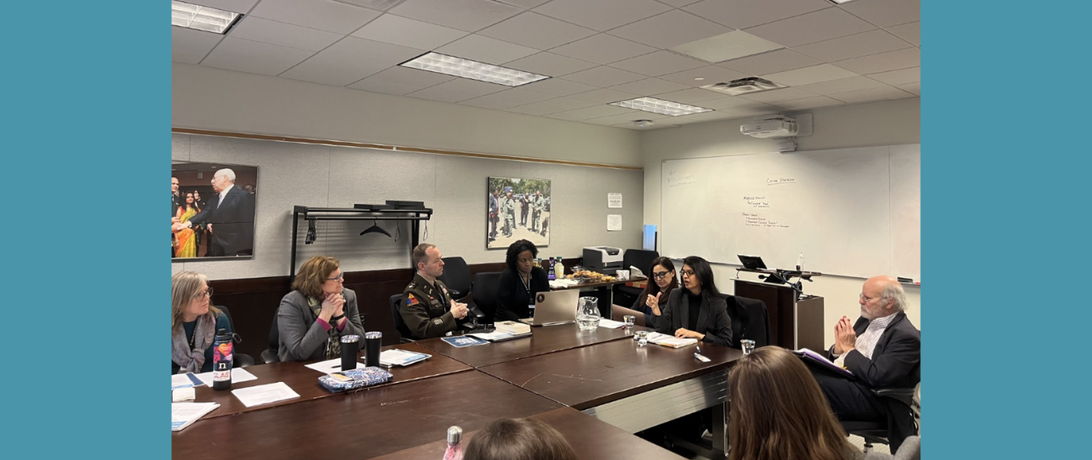
On December 13, Ambassador Donald Steinberg and Our Secure Future (OSF) Director Sahana Dharmapuri delivered a presentation to a National Defense University (NDU) student affinity group, Women in National Security (WINS).
The presentation highlighted the importance of male allies in peace and security as well as the implications across the WPS policy landscape. WINS consists of 30 male and female senior military officials who currently work across numerous government agencies. The purpose of the group is to provide networking opportunities, share leadership perspectives, and promote awareness about the value and need for diversity and inclusion of women as national security leaders.
Ambassador Steinberg, drawing on his experience with the Angolan peace process, emphasized the pivotal role of women in the success of peace agreements. As President Clinton’s special assistant for African affairs, Ambassador Steinberg supported negotiations for the Lusaka Protocol, signed in late 1994, and subsequently was appointed as the U.S. Ambassador to Angola and a member of the Joint Commission to help implement the peace accords. Despite initially characterizing the negotiation and implementation of the peace agreement as “gender-neutral,” Ambassador Steinberg later recognized that a “gender-neutral” agreement is inherently discriminatory against women and is sixty percent more likely to fail The peace accord, which relied on 13 separate amnesties, shielded men from prosecution for sexual and gender-based violence during the conflict, including the use of rape as a weapon of war.
Women were also disproportionately killed by landmines in the post-conflict period as demining efforts prioritized roads over the fields, wells, and forests where women predominantly worked. Ambassador Steinberg and his colleagues worked with human rights defenders and civil society members to increase women’s involvement in the planning and implementation of the peace accords. Leveraging his experience in Angola, Ambassador Steinberg has helped shape impactful policies and programs, like UN Security Council Resolution 1325 and Mobilizing Men as Partners for Women, Peace and Security (MAWPS), a project of Our Secure Future. MAWPS mobilizes leaders to support women's involvement in global peace efforts and addresses funding barriers by providing small unrestricted grants to grassroots organizations.
Ms. Dharmapuri discussed the significance of UNSCR 1325 as a mechanism for transforming structures and norms. The United States adopted its first-ever law on Women, Peace and Security (WPS), mandating strategies and agency implementation plans from DoS, DoD, DHS, and USAID. The recently launched 2023 U.S. Women, Peace and Security Strategy and National Action Plan addresses emerging issues, such as climate change, strategic competition, and technology, and their intersection with WPS.
“It is important for women to not only have a seat at the table but to be deeply involved in the conversations that are shaping policies around these important issues. The inclusion of marginalized voices helps inform policymakers of missing nuances within policy.” - Sahana Dharmapuri
Furthermore, Ms. Dharmapuri recommended that WINS concentrate on specific lines of interest in Department of Defense (DoD) implementation plans during their monthly meetings. She also explained how OSF spearheaded the WPS bipartisan caucus, emphasizing the need to institutionalize WPS and provide technical assistance to policymakers.
Article Details
Published
Program
Content Type
News